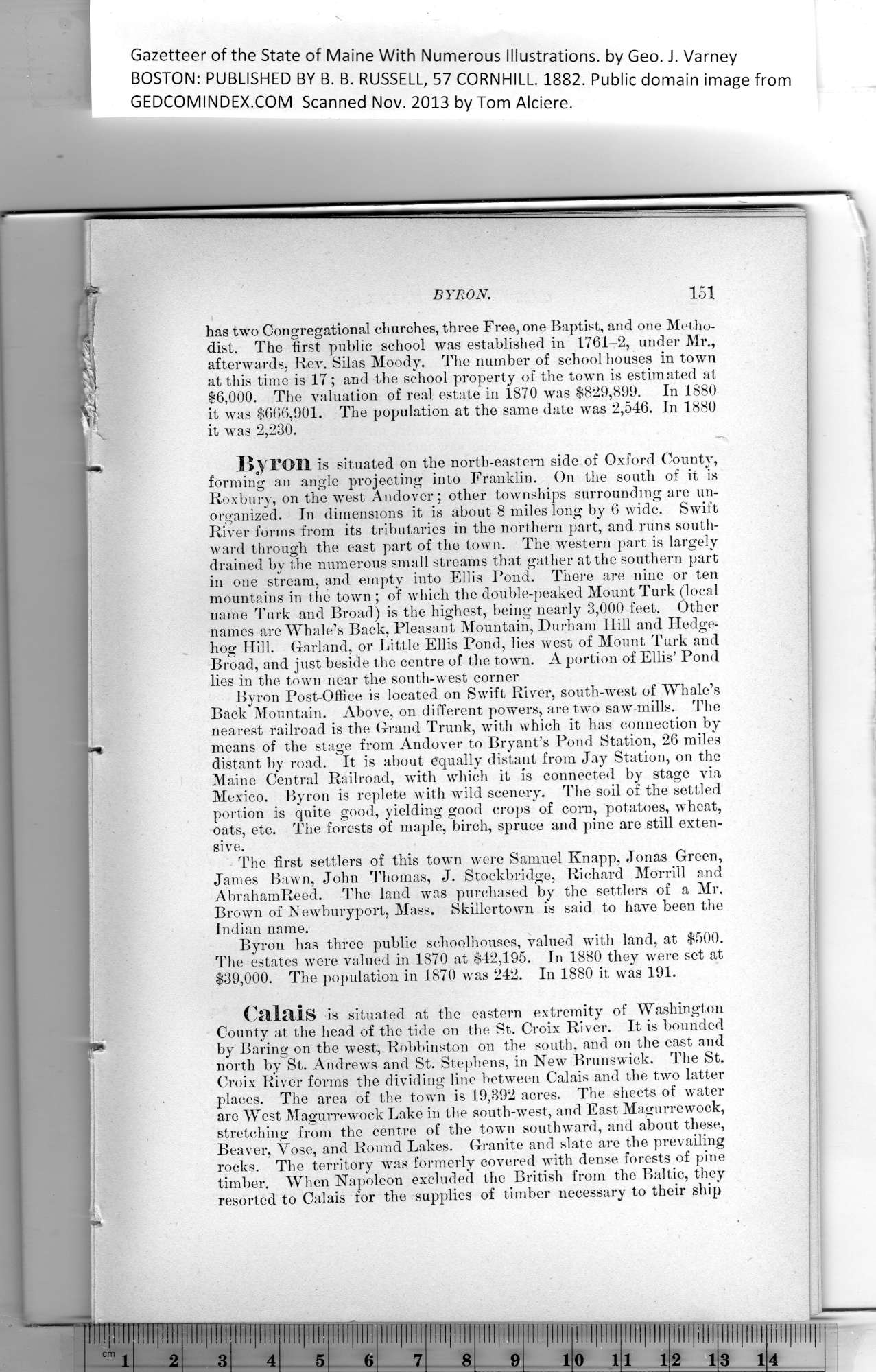|
Gazetteer of the State of Maine With Numerous Illustrations, by Geo. J. Varney
BOSTON: PUBLISHED BY B. B. RUSSELL, 57 CORNHILL. 1882. Public domain image from
BYRON.
has two Congregational churches, three Free, one Baptist, and one Metho-
dist. The first public school was established in 1761-2, under Mr.,
afterwards, Rev. Silas Moody. The number of school houses in town
at this time is 17; and the school property of the town is estimated at
$6,000. The valuation of real estate in 1870 was $829,899. In 1880
it was $666,901. The population at the same date was 2,546. In 1880
it was 2,230.
Byron is situated on the north-eastern side of Oxford County,
forming an angle projecting into Franklin. On the south of it is
Roxbury, on the west Andover; other townships surrounding are un-
organized. In dimensions it is about 8 miles long by 6 wide. Swift
River forms from its tributaries in the northern part, and runs south-
ward through the east part of tbe town. The western part is largely
drained by the numerous small streams that gather at tbe southern part
in one stream, and empty into Ellis Pond. There are nine or ten
mountains in the town ; of which the double-peaked Mount Turk (local
name Turk and Broad) is the highest, being nearly 3,000 feet. Other
names are Whale’s Back, Pleasant Mountain, Durham Hill and Hedge-
hog Hill. Garland, or Little Ellis Pond, lies west of Mount Turk and
Broad, and just beside the centre of the town. A portion of Ellis’ Pond
lies in tbe town near the south-west corner
Byron Post-Office is located on Swift River, south-west of Whale’s
Back Mountain. Above, on different powers, are two saw-mills. The
nearest railroad is the Grand Trunk, with which it has connection by
means of the stage from Andover to Bryant’s Pond Station, 26 miles
distant by road. It is ahout equally distant from Jay Station, on the
Maine Central Railroad, with which it Is connected hy stage via
Mexico. Byron is replete with wild scenery. The soil of the settled
portion is quite good, yielding good crops of corn, potatoes, wheat,
oats, etc. The forests of maple, birch, spruce and pine are still exten-
sive.
The first settlers of this town were Samuel Knapp, Jonas Green,
Janies Bawn, John Thomas, J. Stockbridge, Richard Morrill and
AbrahamReed. The land was purchased by the settlers of a Mr.
Brown of Newbury port, Mass. Skillertown is said to have been the
Indian name.
Byron has three public schoolhouses, valued with land, at $500.
The estates were valued in 1870 at $42,195. In 1880 they were set at
$39,000. The population in 1870 was 242. In 1880 it was 191.
Calais is situated at the eastern extremity of Washington
County at the head of the tide on the St. Croix River. It is bounded
by Baring on the west, Robbinston on the south, and on the east and
north by St. Andrews and St. Stephens, in Newr Brunswick. The St.
Croix River forms tbe dividing line between Calais and the two latter
places. The area of the town is 19,392 acres. The sheets of water
are West Magurrewock Lake in the south-west, and East Magurrewock,
stretching from the centre of the town southward, and about these,
Beaver, Vose, and Round Lakes. Granite and slate are the prevailing
rocks. The territory was formerly covered with dense forests of pine
timber. When Napoleon excluded the British from the Baltic, they
resorted to Calais for the supplies of timber necessary to their ship
PREVIOUS PAGE ... NEXT PAGE
This page was written in HTML using a program written in Python 3.2
|
